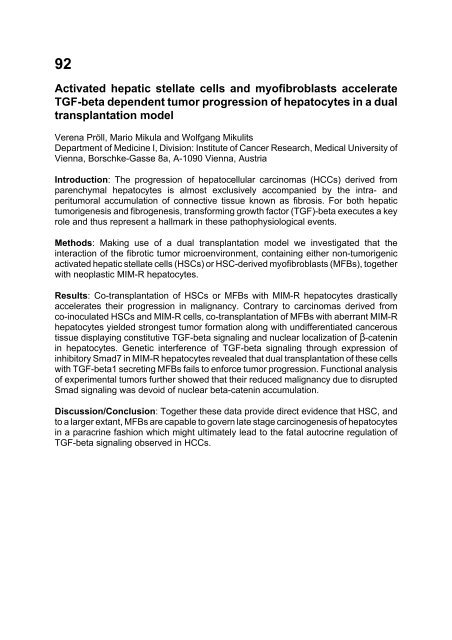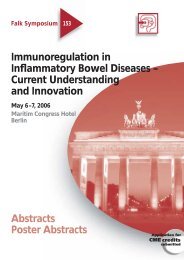- Page 1 and 2:
BERLINAbstractsPoster AbstractsGAST
- Page 3 and 4:
CONTENTSpageCholelithiasis and bili
- Page 5 and 6:
Session Liver IDiagnosis and survei
- Page 7 and 8:
Poster Abstracts1. Autoimmune pancr
- Page 9 and 10:
24. Liver vascular index in NASH, c
- Page 11 and 12:
47. Expression of claudins in human
- Page 13 and 14:
67. Prevalence and association with
- Page 15 and 16:
90. Ursofalk ® in cholestatic live
- Page 17 and 18:
112. Agrin accumulates in the liver
- Page 19:
Molecular mechanisms controlling bi
- Page 22 and 23:
Etiology and pathogenesis of biliar
- Page 25 and 26:
Special Lecture IFuture development
- Page 27 and 28:
Pancreatic carcinoma
- Page 29 and 30:
3. One pancreatic cancer case with
- Page 31 and 32:
However, the Melanoma Genetics Cons
- Page 33 and 34:
the pancreas encouraging duodenum p
- Page 35 and 36:
Pancreatic cancer: Surgery, palliat
- Page 37 and 38:
Special Lecture IIIDevelopment comp
- Page 39 and 40:
Special Lecture IVHow does pancreat
- Page 41 and 42:
Session Liver IDiagnosis and survei
- Page 43 and 44:
Imaging modalitiesProf. Riccardo Le
- Page 45 and 46:
Session Liver IIMetabolic liver dis
- Page 47 and 48:
The role of insulin resistance and
- Page 49 and 50:
other adipocyte-derived factors, in
- Page 51 and 52:
Hereditary hemochromatosis: The gen
- Page 53 and 54:
Wilson disease: The impact of molec
- Page 55 and 56:
Immune pathogenesis of hepatitis B
- Page 57 and 58:
However, neither WHV DNA nor WHsAg
- Page 59 and 60:
The well established antiviral ther
- Page 61 and 62:
Genomics of hepatocellular carcinom
- Page 63 and 64:
A prospective study of more than 22
- Page 65 and 66:
treatment approach with HDACi toget
- Page 67 and 68:
statistically significant differenc
- Page 69 and 70:
Prof. Dr. H. FriessAllgemein-/Visze
- Page 71 and 72:
Prof. Dr. W.E. SchmidtInnere Medizi
- Page 73 and 74:
Autoimmune pancreatitis: An underdi
- Page 75 and 76:
Non-invasive parameters for predict
- Page 77 and 78:
Table 1Agegroups1986-1991m-w1992-19
- Page 79 and 80:
NTCP-mediated bile acid transport i
- Page 81 and 82:
8The use of Ursofalk ® in patients
- Page 83 and 84:
10High expression of agrin in hepat
- Page 85 and 86:
12Chronic liver diseases associated
- Page 87 and 88:
14Determination of hepatitis Delta
- Page 89 and 90:
16Different expressions of claudins
- Page 91 and 92:
For most of the morphological, hist
- Page 93 and 94:
19Clinical and diagnostic value of
- Page 95 and 96:
The impact of steatosis in fibrosis
- Page 97 and 98:
23Unusual association between liver
- Page 99 and 100:
25Effect of molsidomine and sin-1 o
- Page 101 and 102:
27Concentration of antioxidative vi
- Page 103 and 104:
29An assessment of cardiovascular m
- Page 105 and 106:
Conclusions:1. Hepatic stellate cel
- Page 107 and 108:
32Heme oxygenase-1 over-expression
- Page 109 and 110:
34Autoimmune processes and alpha-in
- Page 111 and 112:
36Therapy in non-alcoholic steatohe
- Page 113 and 114:
38A case of hepatocellular carcinom
- Page 115 and 116:
40Antigen-presenting cells in small
- Page 117 and 118:
42Spatial complexity analysis of th
- Page 119 and 120: Endocrine cells in the large bile d
- Page 121 and 122: 46Clinical features associated with
- Page 123 and 124: 48Effect of losartan on early liver
- Page 125: 50Assessment of histological featur
- Page 128 and 129: 53Non-alcoholic fatty liver disease
- Page 130 and 131: 55Helicobacter pylori infection and
- Page 132 and 133: 57Mild to moderate autonomic dysfun
- Page 134 and 135: 58Level of some proinflammatory cyt
- Page 136 and 137: 60Port-site metastasis after laparo
- Page 138 and 139: 62The influence of active prophylax
- Page 140 and 141: 63Progressive familiar intrahepatic
- Page 142 and 143: 65The survival rate among the Slova
- Page 144 and 145: 66ILEI, a novel key component and r
- Page 146 and 147: 68Clinical and pathological signifi
- Page 148 and 149: 70High expression of claudin-7 duri
- Page 150 and 151: 72Microhemorrheological disturbance
- Page 152 and 153: 74High level of vitamin C in rat li
- Page 154 and 155: 76Epidemiological analysis of HBV,
- Page 156 and 157: 78Evaluation of Ursofalk ® 's effe
- Page 158 and 159: 80Is the corticotherapy of malignan
- Page 160 and 161: 82Transdifferentiation of hepatocyt
- Page 162 and 163: 84The study of risk groups for chol
- Page 164 and 165: 86Thrombocytosis as a prognostic fa
- Page 166 and 167: 88Assessment of Helicobacter genus
- Page 168 and 169: 90Ursofalk ® in cholestatic liver
- Page 172 and 173: 94What is the actual prevalence of
- Page 174 and 175: 96Hepatectomy for huge HCCJing-An R
- Page 176 and 177: 98Increased expression of geranylge
- Page 178 and 179: 100Helicobacter pylori eradication
- Page 180 and 181: 102Treatment of pediatric metabolic
- Page 182 and 183: 103A 5-years single center experien
- Page 184 and 185: 104Tissue factor expression in inte
- Page 186 and 187: 106Expression of matrilin-2 in live
- Page 188 and 189: 108The significance of immunohistoc
- Page 190 and 191: 110Hepatocellular carcinoma in pati
- Page 192 and 193: 112Agrin accumulates in the liver d
- Page 194 and 195: 114Prophylaxis of encephalopathy in
- Page 196 and 197: 115Metadoxine modifies both apoptot
- Page 198 and 199: 117Expression of the xenobiotic- an
- Page 200 and 201: Discussion/Conclusion: Compared wit
- Page 202 and 203: 120Functional and morphological inj
- Page 204 and 205: Author Index to Poster Abstracts(Na
- Page 206 and 207: Guizzetti, M. 102Gulubova, M.V. 44,
- Page 208 and 209: Pascu, O. 94Páska, C. 10, 47, 106P



